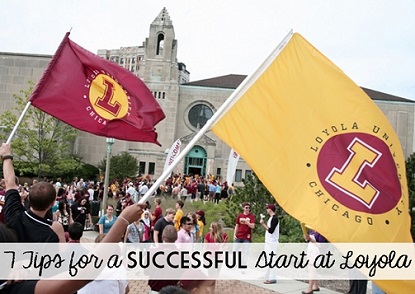7 Tips for a Successful Start at Loyola
Getting off to a good start means you are more likely to finish off your first semester with a sense of achievement, ready to enjoy the winter break, and feeling confident knowing you are ready for Spring. Here are a few pointers to ensure success—and smiles—as you ‘come down the stretch’ in the first fall of your college career:
- Say YES! Whether it’s an offer to go to the dining hall together, to participate in a service event, to try a sport, or to join a student organization, say yes. This is a ‘free’ chance to meet new friends! You never know where it may take you.
- Take control and set goals. Without parents and teachers constantly reminding you what to do, it is easy to procrastinate and forget deadlines, or, for overachievers, put too much on your plate. By setting achievable goals every semester, you won’t lose focus or motivation. Knowing what you’re working toward will keep you on track and feeling confident.
- Go to class. Although professors don’t always take attendance, going to class—while it may sound less important than a final exam—is, unequivocally, the main ingredient for getting a good grade in any course. Simply showing up allows you to familiarize yourself with the professor’s teaching/grading style, plus, you will know the important main ideas, which is like starting at second base when studying for a test.
- Stay on top of reading and assignments. Most professors give assignments every class, so falling behind will cost you. It is hard to catch up when the readings and assignments are long or when projects require adequate preparation time. On a side note, complete assignments even when they are not graded, because the investment is low and the payoff is high; utilize ungraded assignments as a strategy for keeping up in class, as free practice for tests, and as a virtually painless way to master large amounts of content for exams.
- Find a good place to study. Find a quiet place where you feel comfortable and can focus, because you will need it, especially during midterms. Whether it is your room, the floor lounge, or the library, a self-suited location with no distractions will exponentially increase your efficiency—you may be surprised at how much more you can get done.
- Eat healthy and work out. Try to eat in the dining halls as often as possible, firstly, because a meal that can be made in dorm room microwave probably is not very healthful. Maintaining a balanced diet with plenty of fruits and vegetables is important, as lack of proper nutrition can have a negative effect on mood and mental health. Secondly, whether enjoying a cardio-workout, like a Zumba class, or taking a walk along the lake, exercise can also help you de-stress and improve concentration.
- Get enough sleep. This might be the all-time hardest goal for college students to achieve. A Huffington Post study concludes that college students are twice as likely to be sleep-deprived as the general population. Because poor sleep patterns have been linked as a predictor of bad academic performance, depression, and chronic health problems, time management is a crucial factor for success, both during and after college.
